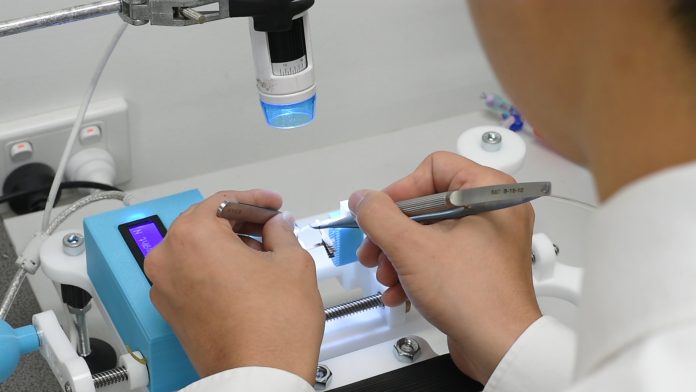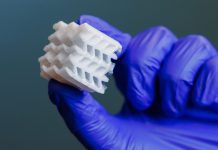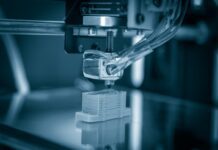
Australia is strengthening its position at the forefront of 3D printing in medicine and health care with a new ARC training centre dedicated to developing the next generation of additive biomanufacturing technology and training the future leaders in this field.
Based at QUT’s Institute of Health and Biomedical Innovation, the ARC Industrial Transformation Training Centre in Additive Biomanufacturing is a collaboration by five Australian universities, the Shanghai Institute of Ceramics, St Vincent’s Hospital in Melbourne and medical industry partners.
The Centre is dedicated to cutting-edge research in close collaboration with hospitals and industry to rapidly translate lab findings into practical patient benefits.
Led by QUT Distinguished Professor Dietmar W Hutmacher, the ARC Centre is already working on three research projects that could become part of everyday medical practice in the near future.
The first research project is aimed at developing a hand-held ‘bio pen’, fed with bioink that will allow surgeons to 3D-print patient-specific cartilage cells on to knee and hip joints to repair and replace cartilage which is the ‘shock absorber’ for our long bones.
The second project could lead to patients spending less time under anaesthetic with the development of a new largely 3D-printed device that would allow surgeons to dramatically improve their suture skills.
Once fully developed, this device will enable surgeons to practise suturing tiny 3D-printed ‘blood vessels, nerves, ligaments and tendons’ to increase their skill and speed and test the quality of suturing lines via measuring the burst strength and water leakage.
The third research project could see cell biology and tissue engineering scientists edge closer to personalised, patient-specific cancer therapy by using 3D-printed hydrogels to model individual patients’ tumours to test for the most effective drug for that particular patient.
Professor Hutmacher said each of the 12 PhD candidates and three post-doctoral researchers at the Centre’s is working with an industry partner and an academic expert in the field in order to bring these findings from ‘bench to bedside’ quickly.
“Our research team includes biomedical engineers, biochemists, surgeons and a lawyer working on every aspect of this game changing field of medicine so it becomes part of everyday medical practice in the near future,” the Professor concluded.
QUT Vice-Chancellor Professor Margaret Sheil AO said the Centre brings together leading talent from the physical sciences, the life sciences and engineering in a close engagement with industry and clinicians,”
“These experts work together to push the frontiers of technology, devising new ways to customise treatments for patients with challenging problems ranging from large bone defects to deafness,” Professor Sheil said.
“Personalised medicine is the approach of the future and at QUT we are at the very forefront of these exciting developments that will benefit all Australians and ultimately patients around the world.”
Universities collaborating with QUT in the ARC ITTC are the University of Wollongong, RMIT, Deakin University and the University of Melbourne.



















